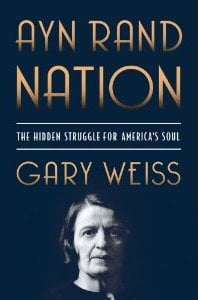Ayn Rand Nation: The Hidden Struggle for America’s Soul, by Gary Weiss. St. Martin’s Press, 2012. 304 pp. $24.99 (hardcover).

The United States of America is heavily regulated and heavily taxed. For instance, in the “Dodd–Frank” Act—an 848-page federal law regulating almost every part of the U.S. financial services industry—one section, known as the “Volcker Rule,” lists 1,420 sub-questions that a bank must answer before it is allowed to engage in proprietary trading. Likewise, the Environmental Protection Agency dictates, among countless other things, where energy companies may and may not dig or drill for resources, how much and what kind of fuel or energy they may produce, and what kind of automobiles, air conditioners, and other machinery Americans may purchase and use. The list of federal laws and regulations goes on and on.
This, of course, is not news. It is widely known that the government controls every sector of the U.S. economy—and that government regulations are expanding. It is also widely known that every U.S. president for decades on end has signed into law more regulations dictating how corporations and industries may and may not conduct business. Gary Weiss, however, says “a U.S. president wouldn’t even think about injecting himself into the affairs of a major industry” (p. 140). His claims about Ayn Rand in Ayn Rand Nation: The Hidden Struggle for America’s Soul make as much sense.
Weiss believes that Ayn Rand’s ideas are driving a dangerous reverence for free markets in America. This, he says, motivated him to write Ayn Rand Nation.
He begins the book by conceding that the left’s criticism of Ayn Rand and her philosophy, Objectivism, has been subpar and ineffective. “[D]ismissing Rand and her followers as cultists,” he says, “ignores the strength of her appeal for nearly seven decades—not to crackpots but to intelligent, educated, even brilliant people” (p. 20). Weiss implicitly promises to raise the bar of Ayn Rand criticism; to eschew the smears, the straw men, and the hearsay that are typical of Rand’s critics; and to deal with her ideas head on. If that is his aim, he certainly has a funny way of going about it.
For example, Weiss mocks Rand’s principle that self-interest is a virtue, not by reference to the kinds of examples and characters Rand provides in abundance in support of her idea, but, rather, by claiming that bailed-out bankers and well-paid government bureaucrats were acting in their “self-interest” as they collected the loot.
Although in Atlas Shrugged Ayn Rand does show businessmen being bailed out and bureaucrats getting fat on the public dole, Weiss somehow missed the fact that these are not the heroes of the book but the villains. He also missed the myriad instances in which their irrationality and parasitism bring them not prosperity and happiness but suffering and death. It seems that, despite his claims to have studied Rand in some depth (p. 21), Weiss may have skipped her magnum opus.
Perhaps he studied her nonfiction works instead?
If so, how did he miss passages such as this, from The Virtue of Selfishness:
The Objectivist ethics proudly advocates and upholds rational selfishness—which means: the values required for man’s survival qua man—which means: the values required for human survival—not the values produced by the desires, the emotions, the “aspirations,” the feelings, the whims or the needs of irrational brutes, who have never outgrown the primordial practice of human sacrifices, have never discovered an industrial society and can conceive of no self-interest but that of grabbing the loot of the moment.
The Objectivist ethics holds that human good does not require human sacrifices and cannot be achieved by the sacrifice of anyone to anyone. It holds that the rational interests of men do not clash—that there is no conflict of interests among men who do not desire the unearned, who do not make sacrifices nor accept them, who deal with one another as traders, giving value for value.*
Maybe Weiss skipped that book too.
What, then, did he read? And how could he have missed the countless essays, articles, and passages in which Rand expressed these and similar aspects of her philosophy? Whether discussing politics in
Capitalism: The Unknown Ideal or metaphysics in
Philosophy: Who Needs It, Rand repeatedly emphasized that there are no conflicts of interests among rational men, that no one’s benefit can be achieved by anyone’s sacrifice, and that a person who sacrifices himself or others ultimately damages or destroys himself in the process.
It is hard to imagine how Weiss could have surveyed Rand’s works and failed to understand such central principles of her philosophy.
As for Weiss’s promise not to resort to the standard leftist approach of smears, ad hominem, and hearsay, you need only open the book to any page to find it a lie. For example, he repeatedly refers to Rand’s inner circle as a “cult” and alleges that it held “trials” for those accused of minor philosophical errors. He passes along the unsubstantiated and absurd claim that Rand became enraged over people using the word “you” instead of “one” in casual conversation. He relays a rumor alleging that she reacted furiously when someone informed her of a fact about the statistical safety of air travel. And so on.
Weiss proceeds this way for some three hundred pages.
Given that fact, there is little more to say of the book than that it should have been titled Ad Hominem Ad Nauseum.
* Ayn Rand, The Virtue of Selfishness (New York: New American Library, 1964), p. 31.


![[TEST] The Objective Standard](https://test.theobjectivestandard.com/wp-content/uploads/2017/10/logo.png)













